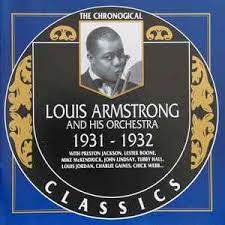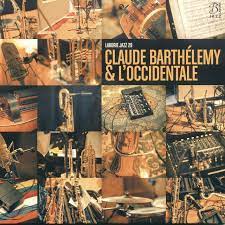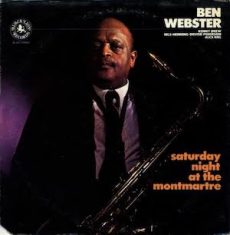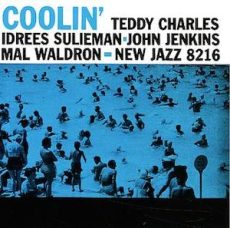
Three Wishes
Nica was curious as to the three wish of Ben Webster but he had only one answer and that was:
- “Right now, I wish I could write a couple of tunes.”
*Excerpt from Three Wishes: An Intimate Look at Jazz Greats ~ Compiled and Photographed by Pannonica de Koenigswarter
More Posts: baroness,history,instrumental,jazz,music,pannonica,saxophone,three,wishes

Daily Dose Of Jazz…
Johnny Lindsay was born John Lindsay on August 23, 1894 in New Orleans, Louisiana and learned both instruments while young. He played trombone in a military band and in ensembles late in the 1910s. While living in his hometown he played with John Robichaux and Armand J. Piron’s Olympia Orchestra.
Lindsay was Piron’s trombonist on recordings made in New York City in 1923 and 1924 and was a member of Dewey Jackson’s riverboat band. Relocating to Chicago, Illinois he played with Willie Hightower, Carroll Dickerson, Lil Hardin, and Jelly Roll Morton’s Red Hot Peppers. Most of his Chicago playing in Chicago was subsequently on bass rather than trombone.
Later in his career Johnny toured nationally with Louis Armstrong in the early 1930s, and then with Richard M. Jones, Jimmie Noone, Punch Miller, Johnny Dodds, Chippie Hill, Georgia White, Harlem Hamfats, and Baby Dodds.
Double-bassist and trombonist Johnny Lindsey, who was active on the New Orleans and Chicago jazz scenes and was sometimes listed as John Lindsey, transitioned on July 3, 1950.

Daily Dose Of Jazz…
Claude Barthélemy was born on August 22, 1956 in St. Denis, France and started playing guitar when he was fourteen years old. He began playing professionally with Michel Portal’s Ensemble Unit in 1978 and worked with Aldo Romano, Stu Martin, and Gérard Marais.
In the early 1980s he assembled a trio with Jacques Mahieux and Jean-Luc Ponthieux. Additionally he worked with Jean-Marc Padovani and Nouvel Orchestre Philharmonique. By the mid-1980s he concentrated on composition, writing for mixed ensembles. Several of his pieces incorporated video and dance.
Barthélemy co-founded the group Zhivaro in 1987 and from 1989 to 1991 was the director of Orchestre National de Jazz. The 1990s saw him leading the octet La Nouvelle-Orleans, the quartet Monsieur Claude, and accompanying Elise Caron and Sylvie Cobo.
Guitarist Claude Barthélemy continues to perform as a director and leader of various ensemble configurations
More Posts: bandleader,composer,guitar,history,instrumental,jazz,music

Requisites
Saturday Night at The Montmartre ~ Ben Webster | By Eddie Carter
This morning’s subject submitted for your consideration is a delightful live date by tenor saxophonist, Ben Webster. Saturday Night at The Montmartre (Black Lion Records BLP 30155) is the first of three LPs chronicling his quartet’s January 30 performance at the renowned club shortly after Ben moved to Europe. Midnight at The Montmartre and Sunday Morning at The Montmartre (1977) complete the evening’s concert. He’s joined on stage by Kenny Drew on piano, Niels-Henning Ørsted Pedersen on bass, and Alex Riel on drums. My copy used in this report is the 1974 US Stereo release (Black Lion Records BL-302).
The rhythm section begins the evening with a bit of relaxed cooking on the introduction to Our Love Is Here To Stay by George and Ira Gershwin. Ben takes the lead on the theme and swings effortlessly on the first interpretation. Kenny and Niels-Henning are completely at ease in the next two readings. Alex and Ben engage in a delightful conversation preceding the theme’s reprise and finish. The pace slows down for a gorgeous rendition of My Romance by Richard Rodgers and Lorenz Hart. A brief introduction by Kenny opens the way for Ben’s richly toned, emotional expression on the melody. The pianist starts the solos with an enchanting presentation, next Webster gives an incredibly beautiful performance ahead of the song ending quietly.
Blues For Herluf is Ben Webster’s uptempo tribute to Jazzhus Montmartre’s manager, Herluf Kamp-Larsen. Kenny kicks off this tune with a brief introduction that evolves into the foursome’s invigorating theme. Ben opens with a hard-blowing swinger. Kenny tells a vigorously spirited story on the second solo. Niels-Henning goes for a short walk in the third spot and Alex’s drums dance briefly with the leader into the finale. The quartet slows the tempo again to begin Side Two with a very pretty song, Londonderry Air. The trio begins their introduction gracefully, then Webster touches a soft spot in everyone’s heart on the theme and provides a wonderful feeling of peaceful serenity as the song’s only soloist into a lovely finale.
Mack The Knife by Kurt Weill, Mark Blitzstein, and Bertolt Brecht first appeared in The Threepenny Opera (1928). The rhythm section introduces this song at midtempo leading to the collective melody led by Ben who also sparkles on the first reading. Kenny and Niels-Henning contribute something fun on the next two solos. Alex and Ben exchange a few riffs before the conclusion. I Can’t Get Started by Vernon Duke and Ira Gershwin is one of the most beautiful standards in The Great American Songbook. The trio introduces the song leading to a sincerely poignant theme by Webster. Drew speaks to the listener intimately in the opening statement. Webster’s passion for ballad interpretation is abundantly evident in a delicately pretty reading perfectly matched to the trio’s sensuous support.
The Theme by Miles Davis brings this set to a close in rapid fashion. The foursome launches the theme collectively, next Ben, Kenny, Niels-Henning, and Alex give four quick statements ahead of the melody’s reprise and the audience’s approval. Saturday Night at The Montmartre and its companions were produced by Alan Bates, and Birger Svan was the recording engineer. The album’s sound quality is amazing with a breathtaking soundstage placing the listener in a seat among the audience as the quartet performs. If you’re a fan of Ben Webster and like your jazz swinging and soulful, I invite you to check out Saturday Night at The Montmartre on your next search for vinyl treasure. It sets the mood for a great evening of jazz that’s perfect to enjoy with the lights dimmed and your favorite drink as you listen!
~ Midnight at The Montmartre (Black Lion Records BLP 30173), Sunday Morning at The Montmartre (Black Lion Records BLP 30182) – Source: Discogs.com ~ I Can’t Get Started, Mack The Knife, My Romance, Our Love Is Here To Stay – Source: JazzStandards.com © 2022 by Edward Thomas Carter
More Posts: choice,classic,collectible,collector,history,instrumental,jazz,music,saxophone

Daily Dose Of Jazz…
Addison Gerald Farmer was born on August 21, 1928 in Council Bluffs, Iowa and was born an hour after his twin brother Art, reportedly at 2201 Fourth Avenue. Their parents divorced when the boys were four, and their steelworker father was killed in a work accident not long afterward. He moved with his grandfather, grandmother, mother, brother and sister to Phoenix, Arizona when he was still four.
Addison and his brother moved to Los Angeles, California in 1945 and attended the music-oriented Jefferson High School. There they gained music instruction and met other developing musicians such as Sonny Criss, Ernie Andrews, Big Jay McNeely and Ed Thigpen. The brothers earned money by working in a cold-storage warehouse and by playing professionally.
Taking bass lessons from Frederick Zimmermann, he went on to study at Juilliard and the Manhattan School of Music. By late 1945, Farmer was with Johnny Alston and His Orchestra recording for the Bihari Brothers’ Modern Music label, and shortly after on the Blue Moon label. He later recorded with Teddy Edwards’s band. Farmer played in several groups with his brother, including in ensembles led by Benny Golson, Gigi Gryce, Mose Allison, Jay McShann, Charlie Parker, and Miles Davis.
Bassist Addison Farmer, who recorded extensively for Prestige Records, transitioned from sudden unexpected death syndrome on February 20, 1963, in New York City at the age of 34.
More Posts: bass,history,instrumental,jazz,music



